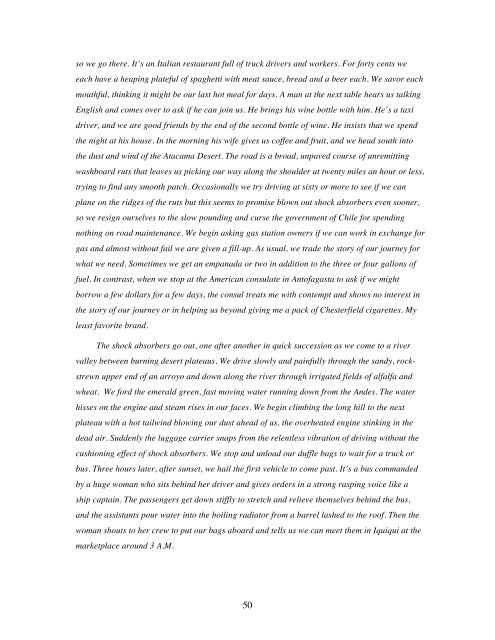Fault Lines - John Knoop
Fault Lines - John Knoop
Fault Lines - John Knoop
Create successful ePaper yourself
Turn your PDF publications into a flip-book with our unique Google optimized e-Paper software.
so we go there. It’s an Italian restaurant full of truck drivers and workers. For forty cents we<br />
each have a heaping plateful of spaghetti with meat sauce, bread and a beer each. We savor each<br />
mouthful, thinking it might be our last hot meal for days. A man at the next table hears us talking<br />
English and comes over to ask if he can join us. He brings his wine bottle with him. He’s a taxi<br />
driver, and we are good friends by the end of the second bottle of wine. He insists that we spend<br />
the night at his house. In the morning his wife gives us coffee and fruit, and we head south into<br />
the dust and wind of the Atacama Desert. The road is a broad, unpaved course of unremitting<br />
washboard ruts that leaves us picking our way along the shoulder at twenty miles an hour or less,<br />
trying to find any smooth patch. Occasionally we try driving at sixty or more to see if we can<br />
plane on the ridges of the ruts but this seems to promise blown out shock absorbers even sooner,<br />
so we resign ourselves to the slow pounding and curse the government of Chile for spending<br />
nothing on road maintenance. We begin asking gas station owners if we can work in exchange for<br />
gas and almost without fail we are given a fill-up. As usual, we trade the story of our journey for<br />
what we need. Sometimes we get an empanada or two in addition to the three or four gallons of<br />
fuel. In contrast, when we stop at the American consulate in Antofagasta to ask if we might<br />
borrow a few dollars for a few days, the consul treats me with contempt and shows no interest in<br />
the story of our journey or in helping us beyond giving me a pack of Chesterfield cigarettes. My<br />
least favorite brand.<br />
The shock absorbers go out, one after another in quick succession as we come to a river<br />
valley between burning desert plateaus. We drive slowly and painfully through the sandy, rock-<br />
strewn upper end of an arroyo and down along the river through irrigated fields of alfalfa and<br />
wheat. We ford the emerald green, fast moving water running down from the Andes. The water<br />
hisses on the engine and steam rises in our faces. We begin climbing the long hill to the next<br />
plateau with a hot tailwind blowing our dust ahead of us, the overheated engine stinking in the<br />
dead air. Suddenly the luggage carrier snaps from the relentless vibration of driving without the<br />
cushioning effect of shock absorbers. We stop and unload our duffle bags to wait for a truck or<br />
bus. Three hours later, after sunset, we hail the first vehicle to come past. It’s a bus commanded<br />
by a huge woman who sits behind her driver and gives orders in a strong rasping voice like a<br />
ship captain. The passengers get down stiffly to stretch and relieve themselves behind the bus,<br />
and the assistants pour water into the boiling radiator from a barrel lashed to the roof. Then the<br />
woman shouts to her crew to put our bags aboard and tells us we can meet them in Iquiqui at the<br />
marketplace around 3 A.M.<br />
50


